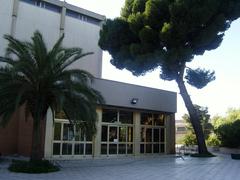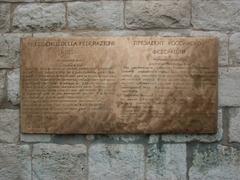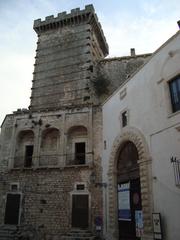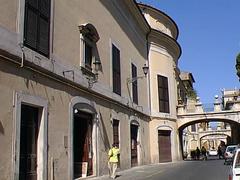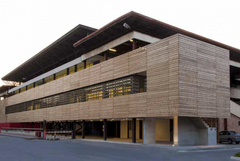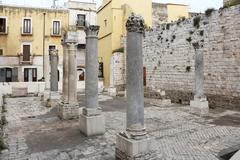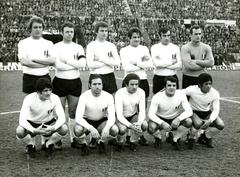
Teatro Piccinni: Visiting Hours, Tickets, and Historical Significance in Bari
Date: 04/07/2025
Introduction
Teatro Piccinni, located in the heart of Bari, Italy, is a monumental emblem of the city’s rich cultural and artistic heritage. Since its inauguration in 1854, the theater has played a pivotal role in shaping Bari’s identity as a center for the performing arts. Named after the renowned Bari-born composer Niccolò Piccinni, this neoclassical masterpiece offers a harmonious blend of historical grandeur, architectural elegance, and a vibrant program of cultural events. Following a comprehensive restoration completed in 2019, Teatro Piccinni continues to serve as a welcoming and accessible venue for both locals and visitors, standing as a cornerstone of Bari’s urban and cultural landscape (BariExperience.com; PugliaCulture; Il Tacco di Bacco).
Table of Contents
- Origins and Architectural Development
- Historical Milestones and Restoration
- Visitor Information: Hours, Tickets, and Accessibility
- Unique Features and Visitor Experience
- Exploring Bari: Nearby Attractions and Tips
- Frequently Asked Questions (FAQ)
- Conclusion and Practical Summary
- References
Origins and Architectural Development
Teatro Piccinni was inaugurated on May 30, 1854, marking a significant chapter in Bari’s cultural evolution (Wikipedia). Designed by Antonio Niccolini, the theater reflects the neoclassical style prevalent in 19th-century Italy. Its façade, featuring symmetrical proportions, pilasters, and arched windows, is both stately and inviting, while the interior boasts an elegant horseshoe-shaped auditorium, gilded boxes, and lavish frescoes. Artistic contributions from Luigi de Luise (frescoes), Leopoldo Galluzzi (stuccoes), and Michele De Napoli (stage curtain) underscore the theater’s artistic richness (PugliaCulture). The statue of Niccolò Piccinni at the entrance highlights the theater’s dedication to its namesake and local musical heritage (BariExperience.com).
Historical Milestones and Restoration
For over a century, Teatro Piccinni has hosted a diverse repertoire: from grand operas and classical concerts to contemporary theater and dance. After closing for nearly a decade due to structural and safety concerns, the theater underwent a meticulous restoration, completed in December 2019. This restoration involved structural reinforcements, conservation of frescoes and stuccoes, modernization of stage equipment, and improvements to audience comfort and accessibility (PugliaCulture). The reopening was celebrated with a series of free performances, reaffirming the theater’s role as a mainstay of Bari’s cultural life (Wikipedia). Ongoing maintenance ensures the venue remains a model for heritage preservation in southern Italy.
Visitor Information: Hours, Tickets, and Accessibility
Visiting Hours
Teatro Piccinni is generally open to the public during scheduled performances, guided tours, and special events. Standard opening times for performances are:
- Tuesday to Saturday: 6:00 PM – 11:00 PM
- Sunday: 4:00 PM – 10:00 PM
- Monday: Closed
Box office hours may differ; it is advisable to consult the official website or contact the theater directly for the most up-to-date information (Il Tacco di Bacco).
Ticketing
- Purchase Options: Tickets can be bought online via the official theater website, at the box office, or through authorized vendors.
- Pricing: Standard tickets range from €10–€45, depending on the event and seat selection. Discounts are available for students, seniors, and groups.
- Subscriptions: Season passes offer savings and priority booking.
Accessibility
Teatro Piccinni is accessible to visitors with reduced mobility, featuring ramps, elevators, reserved seating, and accessible restrooms. For specific needs, contact the theater in advance (Evendo).
Unique Features and Visitor Experience
- Guided Tours: Periodically available, offering insights into the theater’s art, architecture, and backstage areas. Advance booking is recommended.
- Atmosphere: The intimate auditorium, seating around 850–1,000 guests, ensures excellent acoustics and sightlines. Interiors feature plush red velvet seating, ornate balconies, and gilded décor.
- Events and Programming: The theater hosts a diverse array of performances, including drama, dance, concerts, and special festivals. Initiatives like “Portami con te” provide family-friendly experiences.
- Amenities: Cloakroom, bar/café with local refreshments, and a merchandise counter are available during events.
Exploring Bari: Nearby Attractions and Tips
Teatro Piccinni’s central location on Corso Vittorio Emanuele II makes it a perfect starting point for exploring Bari’s historic center:
- Bari Vecchia (Old Town): Wander the narrow streets and visit landmarks such as the Basilica di San Nicola, Cattedrale di San Sabino, and bustling piazzas (Savoring Italy).
- Castello Normanno-Svevo: Discover Bari’s medieval fortress and its exhibits on local history.
- Lungomare Nazario Sauro: Enjoy a scenic promenade with Adriatic Sea views (Trips & Leisure).
- Teatro Petruzzelli and Teatro Margherita: Experience more of Bari’s vibrant performing arts scene.
- Pinacoteca Metropolitana di Bari: Explore Apulian and Italian art collections.
- Pane e Pomodoro Beach: Relax at Bari’s urban beach, 2 km from the city center.
Dining
The area surrounding Teatro Piccinni offers a wide range of dining options, including traditional trattorias and modern bistros. Local specialties such as focaccia barese, fresh seafood, and orecchiette pasta are highly recommended.
Travel Tips
- Transportation: Easily accessible by foot from Bari Centrale train station and by city buses.
- Dress Code: Smart casual attire is recommended, especially for evening performances.
- Booking: Advance ticket reservations are advised, especially for popular shows or during festivals.
Frequently Asked Questions (FAQ)
Q: What are Teatro Piccinni’s visiting hours?
A: The theater is open during performances and guided tours, typically Tuesday to Sunday. Always check the official website for current hours.
Q: How do I buy tickets for Teatro Piccinni?
A: Tickets are available online, at the box office, and through authorized local outlets.
Q: Is Teatro Piccinni wheelchair accessible?
A: Yes, with ramps, elevators, designated seating, and accessible restrooms.
Q: Are guided tours available?
A: Yes, these are occasionally offered and should be booked in advance.
Q: What language are performances in?
A: Most are in Italian; some international productions may have surtitles in English.
Q: What attractions are nearby?
A: Bari Vecchia, Castello Normanno-Svevo, Teatro Petruzzelli, Lungomare Nazario Sauro, and more are within walking distance.
Conclusion and Practical Summary
Teatro Piccinni stands as a beacon of Bari’s cultural and historical legacy, offering visitors an immersive experience in both its storied past and dynamic present. With its blend of neoclassical architecture, artistic programming, and modern amenities, the theater invites audiences of all backgrounds to discover the best of Apulian culture. To make the most of your visit, plan ahead by checking the latest schedules and ticket availability, and explore the wealth of attractions surrounding Bari’s historic center.
For up-to-date information on performances, guided tours, and events, consult the theater’s official channels. Consider downloading the Audiala app for seamless ticket purchases and real-time updates.
References and Further Reading
- BariExperience.com – Teatro Piccinni Overview
- PugliaCulture – Teatro Piccinni
- Il Tacco di Bacco – Discover Teatro Piccinni
- Puglia Live – Umano Collettivo Season 2025-26
- Wikipedia – Teatro Piccinni
Visuals and Media Suggestions:
Include high-resolution images of Teatro Piccinni’s façade and interiors, Bari Vecchia, Castello Normanno-Svevo, and Lungomare Nazario Sauro. Add descriptive alt text such as “Exterior of Teatro Piccinni in Bari historic center” and “Sunset view at Bari Lungomare promenade.” Embed an interactive map highlighting the theater’s location and nearby attractions.
Internal Links Suggestions:
Link to related articles, including “Top Bari Historical Sites to Visit,” “Guide to Teatro Petruzzelli,” and “Bari’s Cultural Festivals Calendar” to further enrich the reader’s exploration of Bari.

